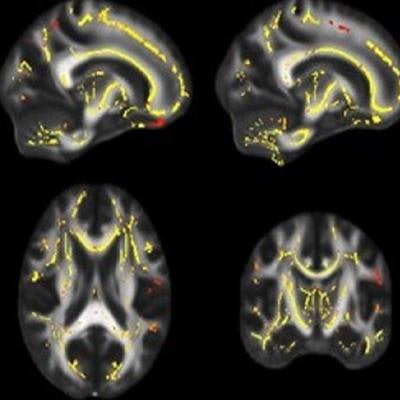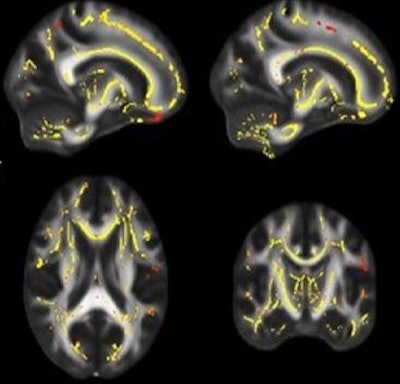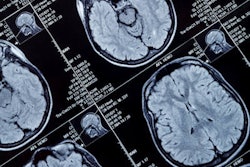
With the aid of diffusion-tensor MR imaging (DTI-MRI), researchers from the University of Texas (UT) Southwestern Medical Center have discovered that a lack of physical fitness can lead to deteriorated nerve fibers in the brain and eventually cognitive decline, according to a study published in the February issue of the Journal of Alzheimer's Disease.
The researchers, led by Dr. Kan Ding, a neurologist from the university's Peter O'Donnell Jr. Brain Institute, targeted white matter, which includes nerve fibers used by neurons to communicate across the brain. When the fibers are damaged or working below capacity, it can lead to memory issues and dementia.
Ding and colleagues analyzed 81 subjects (mean age, 65 ± 7 years): 26 cognitively normal older individuals and 55 patients with memory loss and mild cognitive impairment (J Alzheimers Dis, February 2018, Vol. 61:2, pp. 729-739).
 DTI-MRI highlights areas (yellow and reddish pixels) where the functionality of white matter is associated with higher fitness levels. The images are based on cumulative data from patients to show potential links between physical fitness and deterioration of white matter. Images courtesy of UT Southwestern Medical Center.
DTI-MRI highlights areas (yellow and reddish pixels) where the functionality of white matter is associated with higher fitness levels. The images are based on cumulative data from patients to show potential links between physical fitness and deterioration of white matter. Images courtesy of UT Southwestern Medical Center.All participants underwent a battery of tests, including DTI to assess white-matter fiber integrity, a method known as maximal oxygen uptake to measure the subjects' cardiorespiratory fitness, and memory and other cognitive tests to measure brain function. By doing so, the researchers aimed to determine correlations between exercise, brain health, and cognition.
They found that lower fitness levels were associated with weaker white matter, which in turn correlated with lower brain function.
"This research supports the hypothesis that improving people's fitness may improve their brain health and slow down the aging process," Ding said in a statement.
At the same time, the researchers noted that the study leaves many questions unanswered regarding how fitness and Alzheimer's disease may be connected. For example, what fitness level is needed to notably reduce the risk of dementia? And is it too late to intervene when patients begin showing symptoms?




















